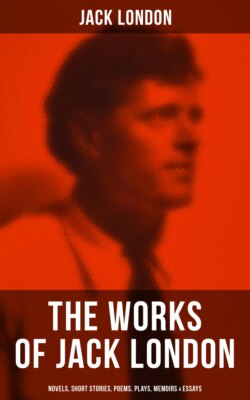Читать книгу The Works of Jack London: Novels, Short Stories, Poems, Plays, Memoirs & Essays - Jack London - Страница 83
На сайте Литреса книга снята с продажи.
XV. From Dane Kempton to Herbert Wace
ОглавлениеTable of Contents
London,
3a Queen's Road, Chelsea, S.W.
March 15, 19—.
Clyde Stebbins was here an hour after your theories and definitions reached me. The fact that I had been reading treason against his sister made me pick my subjects a little too carefully for smooth conversation. Your letter, partly open, was on the table before us, and my eyes fell upon it often as I wondered what it would mean to Hester's brother—if he could read it. I no longer think only of you.
I reject your definition of love. It is not a disorder of the mind and body, nor is it solely the instrument of reproduction. I reject and resent your distinction between the pre-nuptial and post-nuptial states of feelings. Further, I hold that marriage may not be based on affection alone, and I disagree with you that population is better than principle. Children need not be brought into the world at any cost.
Love is not a disorder, but a growth. There is spiritual as well as physical growth. Some men and women never grow up strong enough to love. Their development is arrested, or they are, from the beginning, poor creatures born of starvelings, and perhaps fated to give birth to pale, sapless beings like themselves. Others there are who love, and this is no ill chance, no disease of the mind and body calling for psychiater and physician. It is a strength, a becoming, a fulfilment. Let us reason from the effect to the cause. How does this madness manifest itself? Not in weakness. You never saw a man or woman in love who was the worse for it. The lover carries all things before him, and not for himself alone, but for a larger world than ever had been his. He who loves one must perforce love all the world and all the unborn worlds. This is the way life goes, which is another way of saying it is a scientific fact. That which makes men capable of consecration is not a disorder of the mind and body. It is the greatest of all forces, and it turns the wrangling and grabbing human creature into an inspired poet.
And the cause? The passion for perpetuation and the imagination. We agree. But there are other and more immediate needs than the need of perpetuation that call out love, needs that are peculiarly of the present, being bound up with the steady outreaching for help, for fellowship in the jerky journey through the universe. If love were no more than an instrument of reproduction, you would be right in maintaining that the fastidiousness I insist on is unnecessary and unnatural. If love were that and that alone, there would be no love, which is a paradox indeed.
"Because of our souls' yearning that we meet
And mix in soul through flesh, which yours and mine
Wear and impress, and make their visible selves,—
All which means, for the love of you and me,
Let us become one flesh, being one soul."
I dare a formula: In the beginning love arose in the passion for perpetuation; to-day, the passion for perpetuation arises in love. Just as we put ourselves in the way of natural selection, pitting the microcosm against the macrocosm in a passion of ethical feeling, just so do we reverse for ourselves processes that seem indeed to have all the force of law. This reversal is civilisation.
The lover is impelled to perpetuate himself in the Here and the Now. The law of life exacts from him the tribute of love. Imagination gives the lover the key to the object of his love. He enters and he beholds only the ideal which is hers; for him her clay self and the mere facts of her do not exist. The conditions of love are inherent in civilisation. When purpose is high and feeling rich, when "the everlasting possession of the good" is desired, then is heard the I Am of love.
Now to my definition. Negatively, love is not a disorder of the mind and body, not a madness, since it arises in the eternally most valuable, since it is the culmination of high processes, and since it makes for sanity of vision and strength and happiness. Positively, love is the awakening of the personality to the beauty and worth of some one being, caused by the passion for perpetuation and by imagination. It is a desire to hold to the good everlastingly, and to merge with it.
Aristotle proved to the satisfaction of his time that women have fewer teeth than men. Aristotle was a great man, and besides being a philosopher was the foremost scientist of his day. I cannot help thinking of this prodigious blunder. Perhaps (who knows?) the same famous fate which a sexual classification of teeth enjoys awaits a definition calling love a disorder.
I will continue to-morrow. A note has just been given me calling me to Earl, who is ill, but not seriously. Barbara has prescribed for him a game of chess. The desire to see you again has got into my blood. I think I shall be in the new West and with you before long.
Your friend always,
Dane Kempton.
